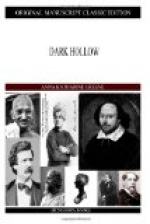XXVIII
THE FIRST EFFORT
LEAVES FROM ALANSON BLACK’S NOTE-BOOK, FOUND BY REUTHER SOME MONTHS LATER, IN A VERY QUEER PLACE, VIZ.: HER MOTHER’S JEWEL-BOX
At the New Willard. Awaiting two articles—Oliver’s picture and a few lines in the judge’s writing requesting his son’s immediate return. Meanwhile, I have made no secret of my reason for being here. All my inquiries at the desk have shown it to be particularly connected with a certain bill now before Congress, in which Shelby is vitally interested.
Perhaps I can further the interests of this bill in off minutes. I am willing to.
The picture is here, as well as the name of the hotel where the two women are staying. I have spent five minutes studying the face I must be able to recognise at first glance in any crowd. It’s not a bad face; I can see his mother’s looks in him. But it is not the face I used to know. Trouble develops a man.
There’s a fellow here who rouses my suspicions. No one knows him;- -I don’t myself. But he’s strangely interested in me. If he’s from Shelby—in other words, if he’s from the detective bureau there, I’ve led him a chase to-day which must have greatly bewildered him. I’m not slow, and I’m not above mixing things. From the Cairo where our present congressman lives, I went to the Treasury, then to the White House, and then to the Smithsonian—with a few newspaper offices thrown in, and some hotels where I took pains that my interviews should not be too brief. When quite satisfied that by these various and somewhat confusing peregrinations I had thrown off any possible shadower, I fetched up at the Library where I lunched. Then, as I thought the time had come for me to enjoy myself, I took a walk about the great building, ending up with the reading-room. Here I asked for a book on a certain abstruse subject. Of course, it was not in my line, but I looked wise and spoke the name glibly. When I sat down to consult it, the man who brought it threw me a short glance which I chose to think peculiar. “You don’t have many readers for this volume?” I ventured. He smiled and answered, “Just sent it back to the shelves. It’s had a steady reader for ten days. Before that, nobody.” “Is this your steady reader?” I asked, showing him the photograph I drew from my pocket. He stared, but said nothing. He did not have to. In a state of strange satisfaction I opened the book. It was Greek, if not worse, to me, but I meant to read a few paragraphs for the sake of appearances, and was turning over the pages in search of a promising chapter, when—Talk of remarkable happenings!—there in the middle of the book was a card,—his card!—left as a marker, no doubt, and on this card, an address hastily scribbled in lead pencil. It only remained for me to find that the hotel designated in this address was a Washington one, for me to recognise in this simple but strangely opportune occurrence, a coincidence—or, as you would say,—an act of Providence as startling as those we read of in books.




